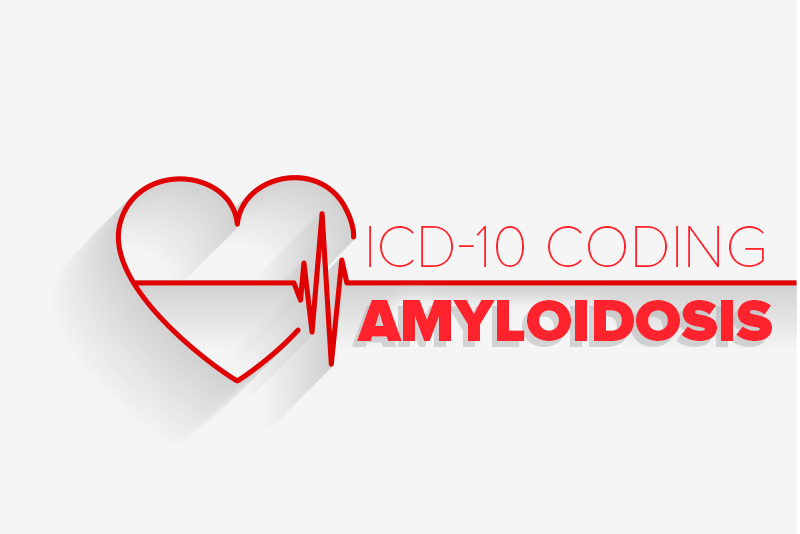Amyloidosis is a rare and serious condition that occurs when abnormal light chain protein (called amyloid) build-up in organs and tissues throughout the body and interferes with their normal function. Amyloid deposits can build up in the heart, brain, kidneys, spleen, liver, nervous system, digestive tract and other parts of the body. The condition can exist on its own or may be related to other problems like hereditary factors, inflammatory diseases or long-term dialysis. A person may have amyloidosis in one organ or several. If not diagnosed early or left untreated, the condition can lead to a chronic form resulting in life-threatening organ failure.
Treatment for this condition may depend on the type of amyloidosis and hence include a combination of medications (to reduce amyloid production), chemotherapy and organ or stem cell transplants (in extreme cases). As cardiology medical coding is complex and tricky, most physician practices rely on medical coding outsourcing to meet their documentation requirements.
As per reports, Amyloidosis affects an estimated 9 to 14 in 1 million people in the United States and 5 to 12 in 1 million people worldwide. When compared to women, the condition tends to affect males more, with about 70 percent of people with amyloidosis being men. In fact, the condition typically affects people aged 60 and older; 64 is the median age at diagnosis. There are different types of amyloidosis which include – AL amyloidosis (immunoglobulin light chain amyloidosis), AA amyloidosis (also called secondary amyloidosis), hereditary amyloidosis (familial amyloidosis), wild-type amyloidosis and localized amyloidosis. Several factors like – age, family history, sex, and long-term kidney dialysis can contribute to this disease. People with chronic inflammations and infections have high risk of developing amyloidosis.
Symptoms That Cause Amyloidosis
Generally, the signs and symptoms develop when the condition reaches an advanced stage. In fact, the symptoms of amyloidosis depend on which tissues and organs are affected. Common signs and symptoms include –
- Swelling of the ankles and legs
- Severe fatigue and weakness
- Unintentional weight loss
- Skin changes, such as thickening or easy bruising, and purplish patches around the eyes
- Shortness of breath
- Numbness, tingling or pain in the hands or feet, especially pain in the wrist
- Difficulty swallowing
- Diarrhea, possibly with blood, or constipation
- An irregular heartbeat
- An enlarged tongue (that looks rippled around its edge)
Diagnosing and Treating Amyloidosis
As the signs and symptoms of Amyloidosis resemble those of more-common diseases, the condition is often overlooked. Early and precise diagnosis of this condition can help prevent further organ damage. Diagnosis of this condition involves a combination of tests like – blood test, urine test, thyroid and liver function test, genetic test, imaging tests and biopsy – that help identify the exact cause. Blood and urine samples may be analyzed to identify the presence of abnormal protein that can indicate amyloidosis.
Based on the signs and symptoms, physicians may also recommend thyroid and liver function tests. Imaging tests like – Magnetic resonance imaging (MRI), Echocardiogram and Nuclear imaging – may also be performed to identify the severity of the disease and the key organs affected by amyloidosis. In case of chronic amyloidosis, biopsy may be performed to determine the type of amyloid deposit.
There is no specific cure for amyloidosis. However, treatment can help better manage the symptoms and limit further production of amyloid protein. However, in certain cases if amyloidosis has been triggered by other conditions (such as rheumatoid arthritis or tuberculosis) treating the underlying condition can be helpful. As mentioned above, treatment involves a combination of medications, chemotherapy and other targeted therapies. In case of chronic cases, other treatment procedures include – autologous blood stem cell transplant, organ transplant and dialysis.
ICD-10 Codes of Amyloidosis
For appropriate reimbursement, healthcare providers should ensure that the diagnostic codes on insurance billing claims for amyloidosis accurately reflect their diagnosis. Cardiologists who treat amyloidosis patients can rely on reputable medical billing companies to code the condition accurately. The following ICD-10 codes are relevant with regard to this disease –
- E85 Amyloidosis
- E85.0 Non-neuropathic heredofamilial amyloidosis
- E85.1 Neuropathic heredofamilial amyloidosis
- E85.2 Heredofamilial amyloidosis, unspecified
- E85.3 Secondary systemic amyloidosis
- E85.4 Organ-limited amyloidosis
- E85.8 Other amyloidosis
- E85.81 Light chain (AL) amyloidosis
- E85.82 Wild-type transthyretin-related (ATTR) amyloidosis
- E85.89 Other amyloidosis
- E85.9 Amyloidosis, unspecified
Identifying the correct medical codes related to documenting amyloidosis is critical for providers. Partnering with a reliable and experienced medical billing outsourcing company is important to ensure accurate and timely medical claim submissions.




